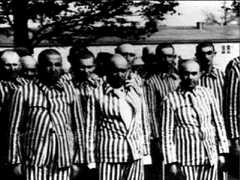Jewish history prof. and journalist debate Joseph's comments
By Bre McAdam
"It means a burnt offering to the Gods," stated University of Toronto Jewish history professor Dr. Frank Bialystok. He says it all comes down to differentiating THE holocaust as a specific historical genocide, and A holocaust being any type of horrific event.
Eagle Feather News editor John Lagimodiere believes the residential school era is Canada's holocaust, and that it has left lasting effects.
"Parents had no choice but to have their children rounded up and taken. So there are comparisons," said Lagimodiere, who believes you can break down the definition of holocaust to mean widespread destruction. "You can make a fair argument that that kind of destruction did happen in the community from the policies in the residential schools and the outcomes."
Saskatchewan NDP candidate says similarities between holocaust and residential school experience
By Bre McAdam
Joseph says he was responding to a specific comment made during a debate on compensation for residential school victims.
"Somebody made a comment to the effect that basically people should get on with their lives and forget. No they shouldn't. They should never do that."
Joseph stands by his comparison, telling News Talk Radio that in his opinion, there are similarities between the two historical tragedies.
"If you look at the dictionary at holocaust it describes an effort to clean-up a race. Without any doubt in my mind that was what the government wanted to do," said Joseph, who claims he wasn't trying to offend anybody but understands there will be some backlash.
Speaking to reporters in Thunder Bay, Ont., on Wednesday night, Layton said he's glad Desnethé-Missinippi-Churchill River candidate Lawrence Joseph has apologized for using those words.
The Holocaust is a term commonly used to describe the systematic murder of six million Jewish people by the Nazis during the Second World War.
Some historians and former residential school students have likened the residential school system as Canada's own holocaust, referring to the abuse and systematic racism experienced in the schools during last half of the 20th century.
Layton said he understood where Joseph, a former chief of the Federation of Saskatchewan Indian Nations, was coming from.
"There's no question that the residential school experience was devastating for a great many aboriginal Canadians. And emotions overtook him," Layton said.
Comparing the Native holocaust to the Jewish Holocaust overall is fair. But the boarding-school experience didn't result in the mass murder of millions of Indians. It was only one small part of the Native holocaust.
In that sense, Joseph's comparison misses the mark. Let's save the term "holocaust" for cases where it really and truly applies.
For more on the subject, see German Canadians Protest Holocaust Exhibit, Gover on Indians and Jews, and Jewish Politicians Want Indians to Disappear.


1 comment:
Genocide is a better word. Holocaust only applies to Jews since it is estimated 6 million were killed whereas with Native Americans, 6 million may be just a fraction of the collective race of Indians that occupied the complete western hemisphere, but were subject to European invasion
AND
boarding schools are only one factor of genocide. Jews were not forced at gun point to change or convert religious faith, language, sign treaties and relocate on a massive scale within both the North and South American continents.
Germany used American methods against the Jews.
Post a Comment